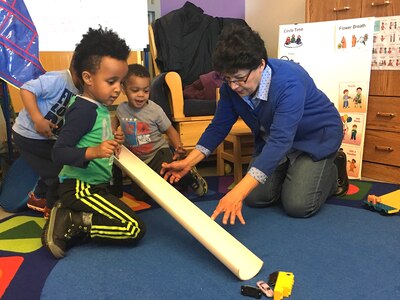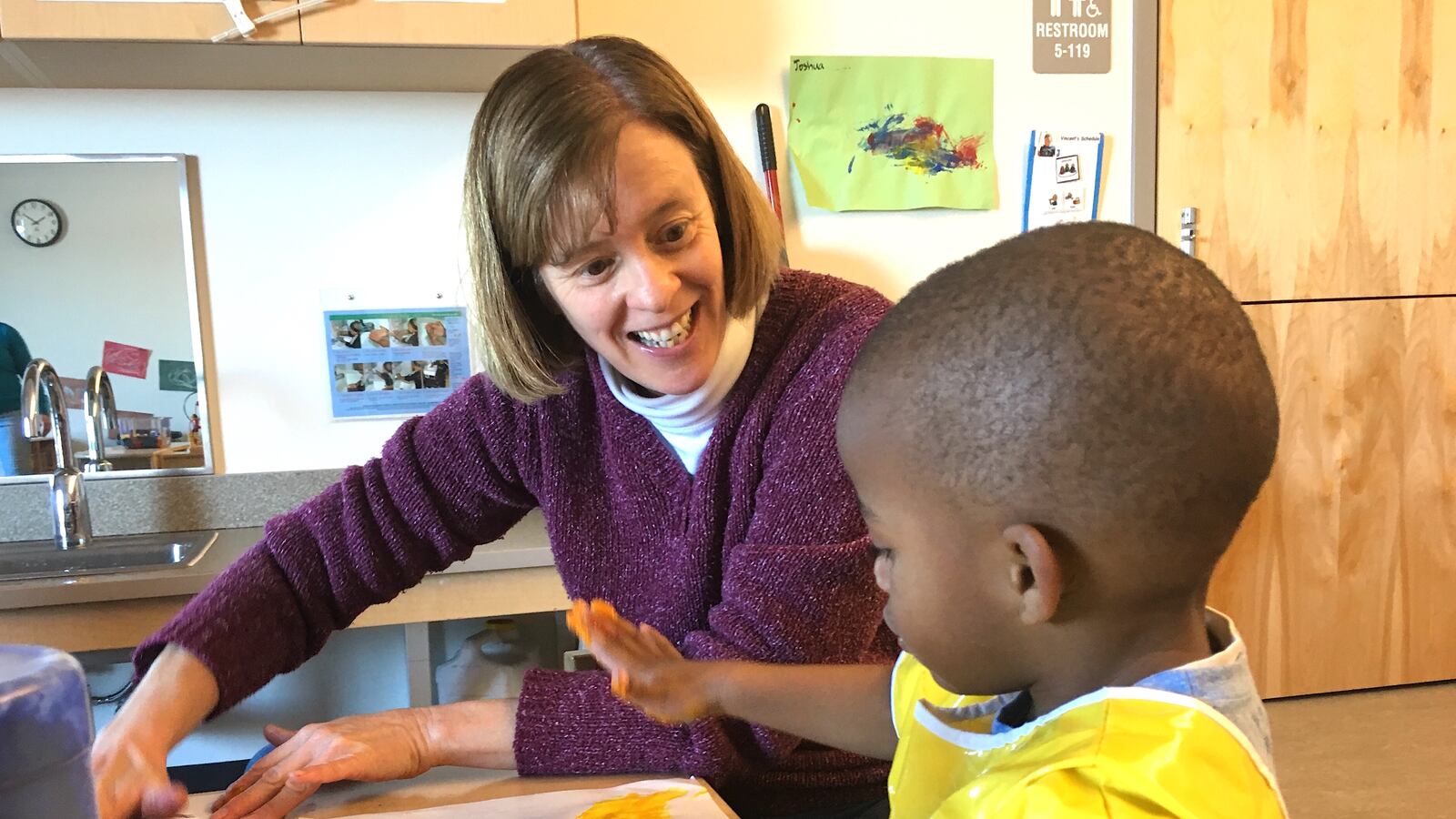Teacher Sandi Polasek was startled by the feedback she received after a classroom coach watched her hold a reluctant toddler by the arm and guide him to the bathroom.
“I want to let you know the way you were holding his arm wasn’t really respectful of him as a person,” the coach told her later.
A longtime child care teacher with a warm personality, Polasek never meant to disrespect one of her small charges. She and the coach talked about strategies for encouraging resistant children to follow her direction and even how to position her hand and body to avoid the controlling arm grip.
“It totally reframed my thinking,” said Polasek.
That incident, which took place a few years ago, provides a glimpse into the role one-on-one coaching plays in helping early childhood teachers improve. In a field where the long-term benefits of high quality child care and preschool are well known — but workers’ education and credentials vary widely — it’s an increasingly common tool.
Lynn Andrews, director of strategic initiatives at the Denver-based nonprofit Clayton Early Learning, said very few child care programs in Colorado used coaching when she got into that work nearly two decades ago.
“There’s been an upward trend,” she said. “There have been a number of studies that show it can improve teaching practice.”
In Colorado, the coaching trend was helped along by an Obama era grant program — Race to the Top – Early Learning Challenge – that awarded the state $45 million for a variety of early childhood efforts. While that money recently ran out, other government, philanthropic, and private programs continue to support coaching for early childhood staff in Colorado and elsewhere. Recently, Head Start, a federally funded preschool program for low-income children, began requiring coaching.
The Denver Preschool Program, which is funded through a city sales tax, will spend about $600,000 on coaches this year — for Polasek and about 700 other preschool teachers, assistant teachers, and child care administrators in the city. While the program is best known for providing tuition assistance to Denver’s 4-year-olds, leaders say improving preschool quality is a key priority and coaching is one way to do that.
One knock on coaching is that it’s expensive compared to other forms of professional development. The Denver Preschool Program, which contracts with Clayton Early Learning and Denver’s Early Childhood Council for coaches, typically pays for six to 12 hours of coaching per person at a cost of $780 to $1,560. The hours are spread out over several months.
Jennifer Landrum, president and CEO of the Denver Preschool Program, said coaching, combined with other quality improvement initiatives, is worth it.
“A one-shot training with 100 people in the room is not going to be individualized,” she said. “The coaching really augments that classroom training to help that teacher put whatever they learned into practice.”
Andrews said the high cost of coaching is already spurring a greater use of technology — say, in the form of videotaped observations instead of in-person visits — that could make it more affordable. In addition, she expects more child care centers will begin using in-house coaches, another trend that could lower costs.
Denver Preschool Program officials say besides paying external coaches to work with preschool teachers as they have since the organization’s inception in 2007, they’ve launched a new effort this year to help some Denver child care teachers earn a state coaching credential so they can mentor their co-workers.

Clayton coach Sheryl Robledo, who’s working with Polasek this winter, said 90 percent of the teachers she’s coached like the experience. For the 10 percent who don’t, the problem is usually scheduling logistics, she said.
“The biggest thing I try to hit home is I’m not here to fix you,” she said. “You’re not getting this because you’re a bad teacher.”
Polasek, who heads a preschool classroom at a Sewall Child Development Center site in far northeast Denver, said coaching helps her grow professionally.
“It’s fun, and I learn so much about myself,” she said. “I love the feedback … that not only tells me what I’m doing right, but tells me, ‘Here’s another way you can do this.’”
Polasek, who has gotten coaching twice previously when she worked at other centers, has a coach this year in part because the preschool where she works will soon be rated through the state’s early childhood quality rating system, Colorado Shines.
While many factors figure into the ratings, preschools can earn extra points when teachers interact well with children — getting down on their level, asking open-ended questions, and encouraging new vocabulary.
These are exactly the kinds of goals Polasek has set for herself in working with Robledo.
On a recent morning, Robledo watched Polasek chat and finger paint with a little boy named Ethan.
“You’re putting that spoon in and scooping the paint,” Polasek told Ethan as he dropped a blob of yellow paint on his paper.
Robledo, who has a master’s degree and the highest of three coaching credentials from the state, praised the banter.
“Good parallel talk,” she said, referring to a practice where adults describe what a child is doing or seeing — building relationships and language skills in the process.
Later, in the whirlwind of children playing and a new student visiting with birthday cupcakes, Robledo nabbed Polasek for a 30-second conversation. Robledo had been playing with children in another part of the room and gave a quick rundown of how she had encouraged turn-taking when she and two boys cut up plastic vegetables with a toy knife.
“Thank you so much,” said Polasek, who’d asked how to promote turn-taking during a previous coaching session. “Thank you.”
Later, when all the children had been picked up, Robledo and Polasek sat in tiny wooden chairs at the finger-painting table for a 15-minute feedback session. Robledo gave Polasek a list of picture book suggestions and a laminated card to help her remember question prompts she could use with the kids.
She also asked Polasek if she liked how the visit had gone, seeing Robledo model and explain techniques as the morning activities unfolded.
“It was nice because you were able to show me right then and there,” Polasek said. “I’m a total in-the-moment person.”


